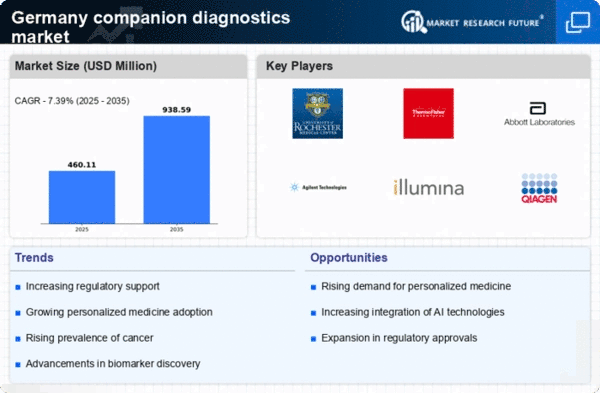Rising Cancer Incidence
The increasing incidence of cancer in Germany is a primary driver for the companion diagnostics-oncology market. According to the German Cancer Society, approximately 500,000 new cancer cases are diagnosed annually, leading to a heightened demand for personalized treatment options. This trend necessitates the use of companion diagnostics to identify specific biomarkers, enabling tailored therapies that improve patient outcomes. As healthcare providers seek to enhance treatment efficacy, the companion diagnostics-oncology market is expected to expand significantly. Integrating these diagnostics into clinical practice is likely to facilitate more precise treatment plans. This approach addresses the growing burden of cancer in the population. Consequently, the market is projected to witness substantial growth as stakeholders prioritize innovative solutions to combat cancer effectively.
Regulatory Framework Enhancements
Enhancements in the regulatory framework governing companion diagnostics in Germany are fostering market growth. The Federal Institute for Drugs and Medical Devices (BfArM) has implemented streamlined processes for the approval of companion diagnostics, which encourages innovation and expedites market entry for new products. This supportive regulatory environment is crucial for companies developing novel diagnostic tests, as it reduces time-to-market and associated costs. As a result, the companion diagnostics-oncology market is likely to expand, with more products becoming available to healthcare providers and patients. The proactive stance of regulatory bodies in Germany not only promotes the development of advanced diagnostics but also ensures that these tools meet the necessary safety and efficacy standards, thereby enhancing public trust in personalized cancer therapies.
Advancements in Genomic Technologies
Technological advancements in genomics are propelling the companion diagnostics-oncology market forward in Germany. The advent of next-generation sequencing (NGS) and other genomic technologies has revolutionized the ability to analyze tumor DNA and identify actionable mutations. This capability is crucial for the development of targeted therapies, which are increasingly becoming the standard of care in oncology. As a result, the market for companion diagnostics is likely to experience robust growth, with an estimated CAGR of around 15% over the next five years. The ability to provide precise genomic information not only enhances treatment decisions but also aligns with the shift towards personalized medicine, making it a vital component of modern oncology practices in Germany.
Growing Awareness of Personalized Medicine
The growing awareness and acceptance of personalized medicine among healthcare professionals and patients in Germany is driving the companion diagnostics-oncology market. As patients become more informed about their treatment options, there is an increasing demand for therapies tailored to individual genetic profiles. This shift towards personalized approaches necessitates the use of companion diagnostics to ensure that patients receive the most effective treatments based on their unique tumor characteristics. The market is expected to grow as healthcare providers emphasize the importance of personalized care, leading to improved patient outcomes and satisfaction. This trend reflects a broader movement within the healthcare system towards more individualized treatment strategies, further solidifying the role of companion diagnostics in oncology.
Increased Investment in Research and Development
Investment in research and development (R&D) within the pharmaceutical and biotechnology sectors is a significant driver for the companion diagnostics-oncology market. In Germany, public and private funding for cancer research has seen a notable increase, with expenditures reaching approximately €3 billion annually. This financial commitment supports the development of innovative diagnostic tools that can identify specific cancer types and their corresponding treatments. As R&D efforts intensify, the companion diagnostics-oncology market is likely to benefit from the introduction of novel tests and technologies that enhance diagnostic accuracy and treatment efficacy. This trend underscores the importance of collaboration between academia, industry, and government in fostering advancements in cancer care.
















